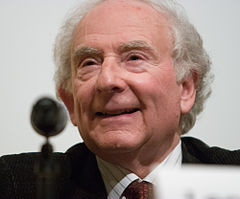
Back ليون كوبر Arabic ليون كوبر ARZ لئون نیل کوپر AZB Леон Нейл Купер Byelorussian Лион Купър Bulgarian লিয়ন কুপার Bengali/Bangla Leon Cooper Catalan لیۆن کووپەر CKB Leon Cooper Czech Leon Cooper Danish
Leon Cooper | |
|---|---|
 Cooper in 2007 | |
| Born | Leon N. Kupchik February 28, 1930 New York City, U.S. |
| Died | October 23, 2024 (aged 94) Providence, Rhode Island, U.S. |
| Alma mater | Columbia University (BA, MA, PhD) |
| Known for | Cooper pairs BCM theory BCS theory |
| Awards | John Jay Award (1985) Nobel Prize in Physics (1972) Comstock Prize in Physics (1968) |
| Scientific career | |
| Fields | Physics |
| Institutions | Brown University |
| Thesis | Mu-Mesonic Atoms and the Electromagnetic Radius of the Nucleus (1954) |
| Doctoral advisor | Robert Serber |
Leon N. Cooper (né Kupchik; February 28, 1930 – October 23, 2024) was an American theoretical physicist and neuroscientist. He won the Nobel Prize in Physics for his work on superconductivity. Cooper developed the concept of Cooper pairs and collaborated with John Bardeen and John Robert Schrieffer to develop the BCS theory of conventional superconductivity.[1][2] In neuroscience, Cooper co-developed the BCM theory of synaptic plasticity.[3]
- ^ "Superconductivity". CERN official website. CERN. July 21, 2023.
- ^ Weinberg, Steven (February 2008). "From BSC to the LHC". CERN Courier. 48 (1): 17–21.
- ^ Bienenstock, Elie (1982). "Theory for the development of neuron selectivity: orientation specificity and binocular interaction in visual cortex". The Journal of Neuroscience. 2 (1): 32–48. doi:10.1523/JNEUROSCI.02-01-00032.1982. PMC 6564292. PMID 7054394.